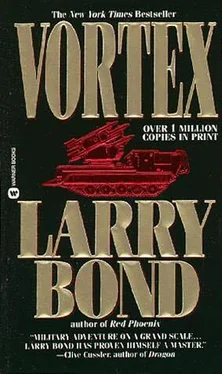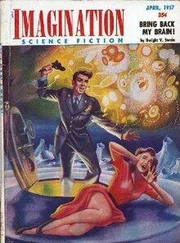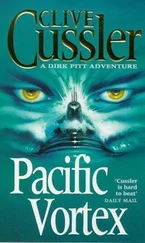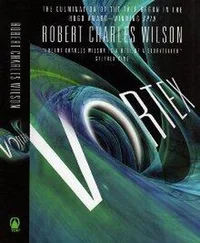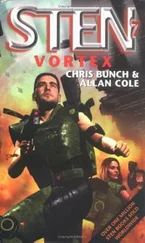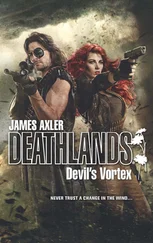Hastings and his company sergeant had posted themselves near the four grenadiers.
Taylor watched as the corporal rejoined them and saw Hastings’s head snap in their direction before turning back to his men. The captain’s arm lifted and then dropped sharply.
Thummp! Thummp! Thummp! Thummp! Tear gas projectiles arced through the air and fell into the soccer stadium, trailing a thin white haze behind them. Wisps of gas started to rise slowly, drifting inland on a light breeze.
“The troops stood and started to move forward at a trot.
Reitz was beside himself.
“Four grenades? My God, that’s a stadium, not a public toilet!”
“He’s trying to give them a warning, a chance to leave without causing a panic.”
“Damn it, man, I want them panicked!” Reitz exclaimed.
“I want them terrified, especially of us!”
Still swearing, the colonel ran after the advancing company, and when he was in earshot, he started shouting, “Fire more tear gas. Fire now!”
Screams and the sounds of dozens of people choking and retching almost in unison were drowning out the muddy, indistinct voice bellowing over the stadium’s public address system.
Hastings looked over his shoulder when he heard Reitz, scowled, and passed the order on to the four men carrying grenade launchers. Another salvo of tear gas grenades arced into the air and fell inside the crowded stadium.
The colonel grabbed Hastings by the arm and swung him around.
“Have these men fire and fire again until they do not have any more projectiles! Then tell me and I will find more for them to use! Is that clear?”
Hastings nodded silently and after half a beat, saluted. Reitz ignored him. Instead, he turned away and followed the advancing troops, staying about five meters behind the command group.
More grenades soared through the air and fell into a growing haze. A few scattered and landed outside the stadium walls, but most went straight in. Taylor noticed that the loud voice on the loudspeaker had stopped, but that the screams and half-choked shouts from inside kept growing in volume.
Small bands of brown, black, and white protestors milled in confusion around the entrances to the soccer field-still unsure of the Army’s exact intentions.
Suddenly the screaming in the stadium moved outside. A mass of people, individuals indistinct at a hundred meters’ distance, surged out the door nearest to Hastings’s troops. Other throngs of fleeing demonstrators were pouring out the other exits, eager to escape what must be chaos among the tear gas-filled bleachers and soccer field.
Hastings motioned to a sergeant, who raised a bullhorn and yelled, first in Afrikaans and then in English, “Halt and surrender! If you flee, you will be shot.” As if to add substance to this threat, Taylor heard rifle fire from the far side of the stadium. That bastard Kloof and his men were already at work.
The mob ignored the sergeant’s warning. A few men and women near the edges seemed to hear, but even they ran. Taylor could see several people with bloodied limbs or heads, undoubtedly injured in the crush to get out through the narrow, body-packed exits. He shook his head slowly in dismay.
The colonel’s tear gas barrage had driven this crowd beyond reason.
A few rocks and bottles flew in the soldiers’ direction as some of the more militant protestors tried to retaliate. None landed very close.
Reitz took it all in and smiled thinly again.
“That’s one way to stop a show. Now fire a warning burst over their heads. “
Tight-lipped, Hastings nodded and gave the order. His men lifted their assault rifles and fired a ragged volley into the air. The stone throwers fled, but panicked protestors continued to stream out of the exits and away from the soldiers.
That was enough for Reitz, who shouted, “Fire again, damn it, and this time aim for the crowd!”
What? Till now, Taylor had hoped against all the evidence that the colonel’s ugly threats were mere bravado and bluster. Too late, he realized that Reitz had meant every word. He stepped forward to countermand the order….
A hundred rifles cracked as one, this time pointed straight at the disordered mass of people streaming out of the stadium.
Almost every bullet struck home-puncturing lungs, shattering bones, or ripping through arms and legs. Taylor saw dozens of people jerk and fall as they were hit. Hundreds of others fell flat as well, trying desperately to find cover on the open ground. A few people kept running, but most stopped, shocked and stunned by the blood and death around them. Ominously, in the sudden silence after the volley, they could still hear steady firing from the other side of the stadium.
Taylor stared from Reitz to the broken and bleeding bodies littering the trampled green grass and back again. Incredibly, the Afrikaner wore a small, pleased smile. Enough!
He moved in front of Reitz and yelled, “Cease fire!” Hastings immediately echoed him.
“These poor people are no further threat to us or anyone,
Colonel. ” Taylor ground the man’s rank out between clenched teeth.
“I’ll order the men to move in and start making arrests.” Taylor turned to issue
Hastings new orders and felt himself spun back round.
the colonel’s face was red, almost purple with rage.
“Rooinek swine! I will not have one of my orders countermanded. You and Hastings are both under arrest! Report to headquarters at once and stay there until I have time to deal with you!”
Then, his voice rising, he shouted, “Since you love these people so much, you can join them in prison! I’m taking personal command of this company, and I’ll do what you are apparently unable and unwilling to do-put an end to this lawbreaking! “
Taylor stared at Reitz in amazement. Had the man gone utterly mad?
“What lawbreaking?” He pointed toward the bloodsoaked lawns and gravel paths outside the stadium.
“It’s over! Finished! My God, can’t you see that?”
Reitz was still in a rage.
“Major, I don’t want to hear any more from you! You don’t know how to deal with these criminals, and you don’t want to learn. Get out of my sight-and take that weakling Hastings with you!
By the time I’m through, you’ll both be lucky if you’re not hanged!”
Taylor stared at his colonel a moment longer before trained reflexes and ingrained discipline took over. He stiffened to attention, turned, and started walking back to the command post with Hastings trudging silently at his side. He felt strangely empty of emotion, unsure of whether he should feel shock at the slaughter he had just witnessed, anger at Reitz, or shame at his relief. No, not shame. He’d done nothing wrong.
Behind him, the demonstrators were beginning to stir. Many knelt weeping by dead or dying friends. Others sat shaking, unable to move. A few were crawling away in a futile search for better cover or escape. People were still trying to get out of the gas-filled stadium, but those in front, who saw the horror before them, were trying to turn around. Being choked and blinded by tear gas must have seemed preferrable to being butchered on the open ground.
The long, thin line of South African soldiers looked numbly at the carnage in front of them, each obviously trying to reconcile his own actions with his conscience. Murder was not a part of the soldier’s code, and this had been a kind of murder. Their lieutenants and noncoms glanced uneasily at each other-shocked by the open break between their colonel and the battalion’s secondin-command. Taylor was one of them-a fellow reservist and a peacetime neighbor.
Reitz swept the formation with an ice-cold glare, and they all turned to face forward, Deliberately, he called out, “A Company, at the rioters, fire!”
Читать дальше
